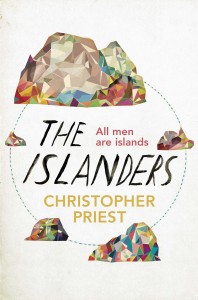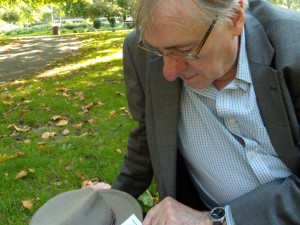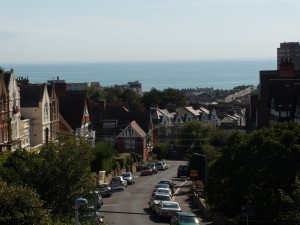The first Dream Archipelago stories I read were the three that were originally published in the 1979 collection An Infinite Summer. It was during the late eighties or early nineties that a close friend recommended I read A Dream of Wessex, and I liked the novel so much that I was keen to track down some more books by the same author. I had never heard of Christopher Priest before, and it was to be another fifteen years before we actually met.
An Infinite Summer was like no other book I had ever read. Unlike most other short story collections I had encountered, the stories seemed to belong together, to feed off each other, to produce a cumulative effect of mystery and enchantment. ‘Whores,’ ‘The Negation’ and ‘The Watched,’ all set in an imaginary maritime state the writer named as the Dream Archipelago, clearly did belong together. Yet the characters and situations in each story were different, the stories were not linked in the conventional sense.
I liked the feeling the stories gave me of recognising something I could not quite name. I read them again and again, hoping each time that I might finally be able to come up with a definitive explanation of what they ‘meant,’ failing to do so (of course) and yet loving them all the more for being so determinedly elusive. A year or so later I came across a battered second hand copy of the Ramsey Campbell-edited anthology New Terrors 2, and here was ‘The Miraculous Cairn’. Next came The Affirmation, and at this point I realised that Christopher Priest was not just an interesting writer but a great one. I will never forget the feeling of excitement and delight that overcame me when I turned from page thirty-nine to page forty and discovered I was in the middle of a new and still more complex Dream Archipelago story. That shock of recognition remains undimmed, and even though I have reread the novel three or four times since the joy and satisfaction I find not just in the rapture of the islands but in the adept, knowing and above all beautiful way The Affirmation has been put together is a guiding constant. What raises Chris’s work unerringly into the realm of true literary excellence is the way it fuses both narrative and formal values into an indivisible whole. In all of Chris’s novels the story is easily accessible, engrossing and enthralling the reader from the first page. By the time you finish the book though you realise that an important part of the story lies in the form it has taken, in the way it has been presented to you; your feelings about the personalities and plights of the characters are very much tangled up in your feelings not only about the story you have just enjoyed but about the more abstract concept of the novel as a literary construct. Readers of a nervous disposition usually equate post-modernism with obscurity, obfuscation and, dare I say it, tedium; the novels of Christopher Priest take post-modernism and make it thrilling. Instead of making the reader feel small, they invite him in and make him complicit. A Priest novel can be read repeatedly with increasing satisfaction and yet there is always that sense of surprise, that this time it might all work out differently.
The Islanders came into existence almost by accident. In 2009, ten years after Simon and Schuster published The Dream Archipelago, Gollancz put out a revised and expanded edition that included two important new stories and brought the ‘mythos’ fully up to date. The Dream Archipelago is vitally important to Chris, both as a playground for story and as a literal embodiment of the creative process, of what it is like, in short, to be a writer. He loves the iconography of the Archipelago – ships, islands, poets, monsters – and finds a recurring intellectual and emotional freedom in its infinite spaces. He was coming to realise that his very fascination with this imagery could in itself be the subject for a story, and around the time the Gollancz edition was published he began compiling a list of all the place names – islands, ports, seas, topographical features – he had previously referred to in the course of his writing about the Dream Archipelago.
There were masses of them. For me, the completed alphabetical list read like a piece of blank verse, with something of the same hypnotic resonance of the Radio 4 Shipping Forecast. Above all it was a list of possibilities. At the time he compiled the list, Chris had just started work on a new novel, The Adjacent, a dark, hard-hitting story of love and war that in many ways would seem to be the natural follow-up to The Separation. But something mysterious and unexpected began to happen. In the spaces of time when he was not actively working on The Adjacent, Chris kept going back to look at his list of islands and it wasn’t long before he started adding to it: not place names this time but details of the language, culture and currency of each island, short passages of landscape description, eventually scraps of story.
The Islanders literally took over. In the end Chris laid The Adjacent aside for later (it is now two-thirds complete) and began to work on his island odyssey in earnest.
Seeing the novel take shape is an experience I would most liken to watching someone working on an exceptionally complex jigsaw puzzle. Those who know Chris’s work will not be surprised to learn that The Islanders was not written in a linear fashion. Odd pieces went in here and there. Bright colours flared up first in one corner, then in another. These individual narrative strands proved so diverting that the appearance of the finished picture – suddenly, and yet with such inexorable logic – acted like a shot of adrenalin.
What is this book about exactly? The cover blurb describes it as ‘a tale of murder,’ which it is, although the murder that takes place does not form the central action of the book and may not even have been a murder at all. You could call The Islanders a detective story, although if it’s a police procedural you’re after, you’re in for the mother of all shocks. Those who have already travelled through the Archipelago will glimpse again characters they encountered in ‘The Miraculous Cairn’, ‘The Negation’ and ‘The Trace of Him’, and yet The Islanders is completely self-sufficient; you don’t need to have read a word of Priest to be able to understand and enjoy this novel.
It’s a novel about the duplicity of time and mind. It’s a love story. It’s a journey to faraway places. Above all though it’s a book about how books are written, a novel about what art means, the living dialogue between writer and reader. And it is beautiful. A lot has been written about Christopher Priest’s writerly sleight of hand, his ability to construct plots with more complications than a top-of-the-range Breitling. The critics get so excited about this that they sometimes forget to mention the luminescence of Priest’s prose, its rapturous melancholy. Priest’s Dream Archipelago stories are elegies for a place that never existed, yet is ever present, like our unuttered wishes, in us all.
When I first met Chris in 2004 he was in a process of recovery. The Separation had been his most ambitious book to date, and his experience with his then-editor at Simon and Schuster had proved damaging and deeply demoralising. One of the first conversations we had was about that, about the scars that can form when a writer has been creatively injured.
Chris is now writing better than ever and The Islanders is the first fruit of that. Seeing an artist of gift and talent properly immersed and absorbed in that task he was born to do is both a privilege and a deep joy.
The Islanders is published tomorrow, 22nd September 2011. Chris will be talking about the novel and signing copies at Foyles on Thursday September 29th, and again at FantasyCon on Saturday October 1st. Tickets for the Foyles event are free, but they are going fast, so best get in there quick if you’d like one!


Chris Priest, Brunswick Square August 2011






